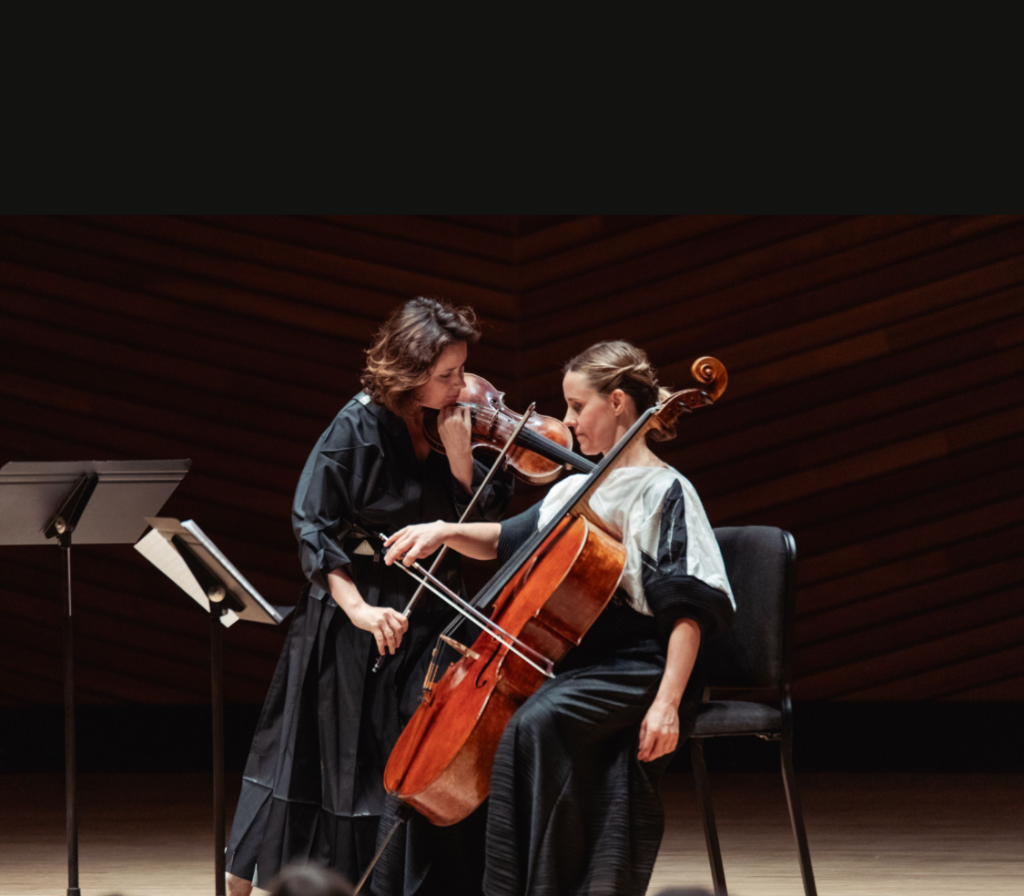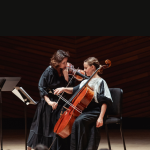Two different recital styles enliven the music festival’s week

Blake Nelson/Courtesy photo
The best recitals take an audience on a memorable journey. It’s even more magical when soloists offer a unique program. Such was the case in two unforgettable performances this past week in Harris Hall.
Other than sheer virtuosity, there was nothing “usual” about Patricia Kopatchinskaja’s and Sol Gabetta’s first appearances in this festival Monday evening. In fact, “recital” is far too tame a description.
For the opening piece, the violinist (whose pen name for her own compositions is PatKop) and cellist Gabetta tromped barefoot from opposite sides of the Harris Hall stage, jingles attached to their ankles. Leclair’s Tambourin in C major, a short rollicking piece that dates from the mid 18th century, set an audacious tone.
Classical music for unaccompanied violin and cello is itself relatively rare. In each half, an assortment of short bits, mostly by the 20th- and 21st-century composers the artists favor, led up to Ravel’s sonata and Kodály’s duo, the best known.
A concert full of biting, iconoclastic pieces, even short ones, could scare off an audience, but these two artists rolled out their own secret weapon. At every turn in the music, their facial and body gestures, often seen in rock concerts, spiced up the visual aspects. The grit and wit in two of Jörg Widman’s sarcastic duos benefited from their emphasizing the musical twists and jokes. So did the dissonant flares in PatKop’s own “Ghiribizzi” (“whims”) and Xenakis’s exaggerated Greek sonorities in “Dhipli Zyia.”
In between, they sneaked in a Prelude from J.S. Bach’s Inventions and a lively transcription of a C.P.E. Bach keyboard piece.
The Ravel and Kodâly pieces may not be as ear-pleasing as some of their other music, but the players’ gestures provided a visual guideline for listeners. The results were received enthusiastically. An encore lightened things up with a dancelike short: Jean-Francois Zbinden’s “Fête au Village.”
A different kind of genius was in play at pianist Tom Borrow’s extraordinary recital on Wednesday, also an Aspen debut. In contrast to Monday’s borderline mayhem, Borrow, 25, approached the piano with quiet devotion — not unlike his mentor, Murray Perahia. As technically brilliant as young pianists are these days, Borrow distinguished himself with music that felt revelatory, with a touch that conjured many colors. His versatility wove the notes into a remarkably eloquent fabric.
Technically the program was all Bach and Schumann, except the Bach was a series of late 19th- to mid 20th-century composers expanding on the originals. Feinberg’s eight minute meditation on the Largo from Trio Sonata No.5 in C major set a serene tone, and when the audience didn’t applaud, Borrow improvised a two minute bridge to Rachmaninoff’s elaborate version of three movements from Partita No.3 for Unaccompanied Violin in E major. That segued beautifully into Petri’s more conservative version of “Sheep May Safely Graze.”
None of that could prepare an unsuspecting audience for Busoni’s exuberantly harmonized Chaconne from Partita No.2 for Unaccompanied Violin, a pinnacle of violin music. The extravagant pianistic flourishes made it into an entirely different experience.
After intermission, Schumann’s 30 minute Fantasy in C major hit all the right buttons, with impeccable technique and a superb sense of what to emphasize and where to soften. The finale filled the tempo description to a T — “slowly sustained, soft throughout” — a perfect bookend to the Largo that started the evening.
Thursday evening, the ever-ebullient Nicholas McGegan conducted and narrated an evening of Baroque music in Harris Hall that included as snappy a performance of J.S. Bach’s Violin Concerto in E major as we are likely to hear. Yvette Kraft, who won last year’s concerto competition here in Aspen, dived into the music with zest. Her bold, full tone was not the slender sound that’s been associated with Baroque performance in recent decades; it filled the hall with juicy, and satisfying, music.
The 27-piece orchestra played well throughout, especially the woodwinds in the opener, a charming suite from Rameau’s “Castor et Pollux,” and 10 of the 11 movements in Handel’s “Water Music” suite.
On Tuesday, the annual joint concert performance by the music festival and Theatre Aspen did justice to the Broadway musical classic “My Fair Lady.” A starry cast of Broadway veterans, in a somewhat awkward semi-staged production directed by Maggie Burrows, benefited the most from Andy Einhorn’s energetic and pinpoint conducting of the timeless Lerner and Loewe score. A 65-piece orchestra, all young musicians in the festival’s school except for concertmaster Renata Arado, brought it to life with big orchestra sound.
To really appreciate the excellence of this effort, I had to ignore the scripts the members of the cast consulted constantly so as to concentrate on the concert aspect. They delivered their lines with feeling, and did well with the English accents. Overloaded amplification blurred much of the song lyrics, especially from the men.
The standout in the cast, as Eliza Doolittle, was Julie Benko, the breakout star of Broadway’s 2022 “Funny Girl.” She traced the character’s trajectory from Cockney flowergirl to fully fleshed-out lady, and nailed every song, from “Wouldn’t It Be Loverly” to a bubbly “I Could Have Danced All Night” with a voice that cut through orchestral density with panache. As Professor Henry Higgins, Raúl Espinoza caught the character’s snottiness in “Why Can’t The English?” and hinted at his softening grumpiness as he fell for Eliza in “I’ve Grown Accustomed to Her Face.”
Other Broadway veterans did their thing: As Eliza’s dad, Adam Heller injected two well-played comedy songs, “With A Little Bit of Luck” and “Get Me to the Church On Time.” Gregory Lee Rodriquez did well with “On the Street Where You Live” and Nathan Stampley made a proper foil for the professor throughout.
Not to miss in the coming days: The debut of Mozart’s “Così fan tutte,” directed by Renée Fleming, gets the first of three performances on Monday at the Wheeler Opera House. What more need be said? Meanwhile, Sunday’s Festival Orchestra program offers a lush menu featuring soprano Ana María Martînez singing Ravel and pianist Seong-Jin Cho playing Mendelssohn.
Harvey Steiman has been writing about the Aspen Music Festival for more than 30 years. His reviews appear in The Aspen Times on Tuesdays and Saturdays.




